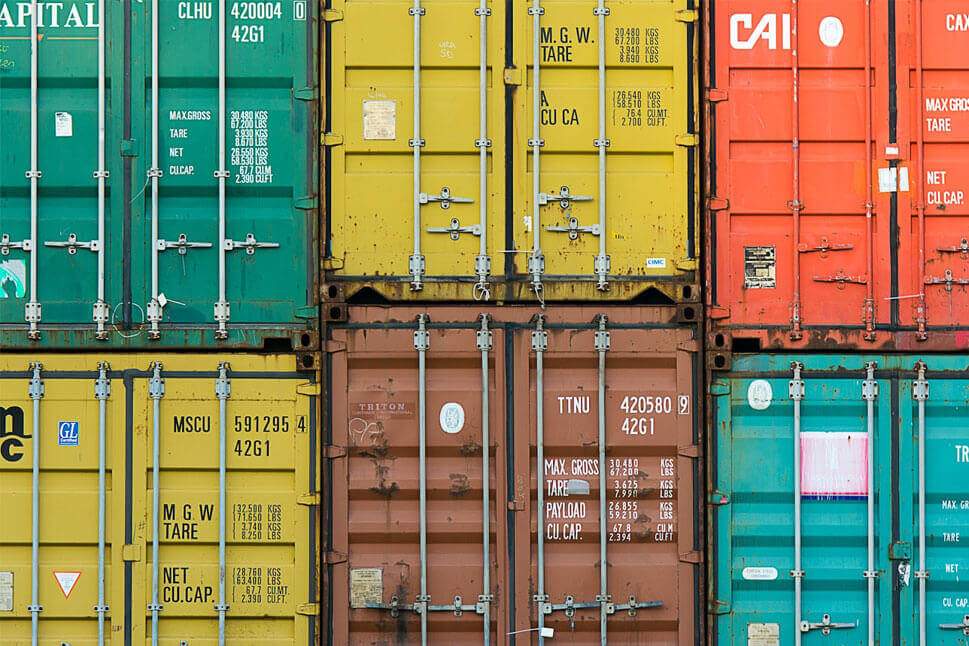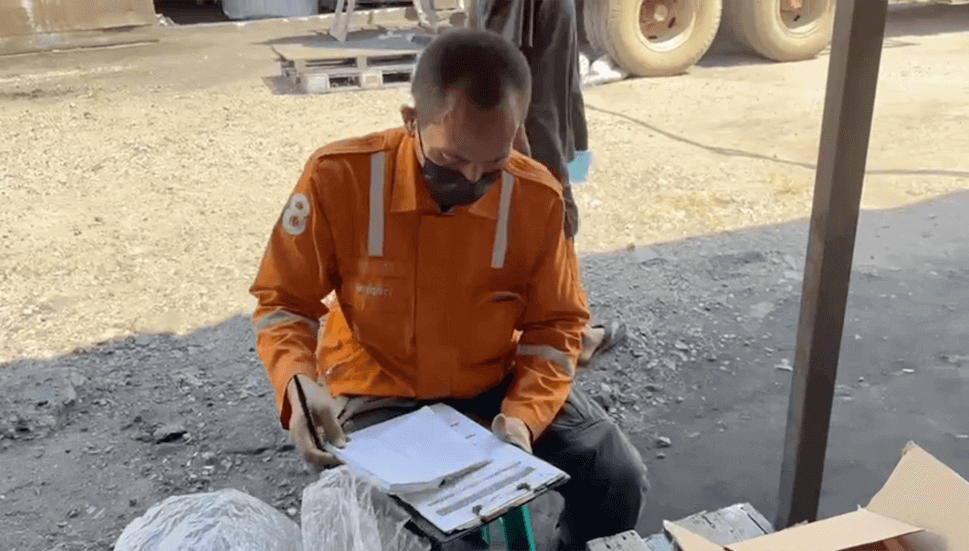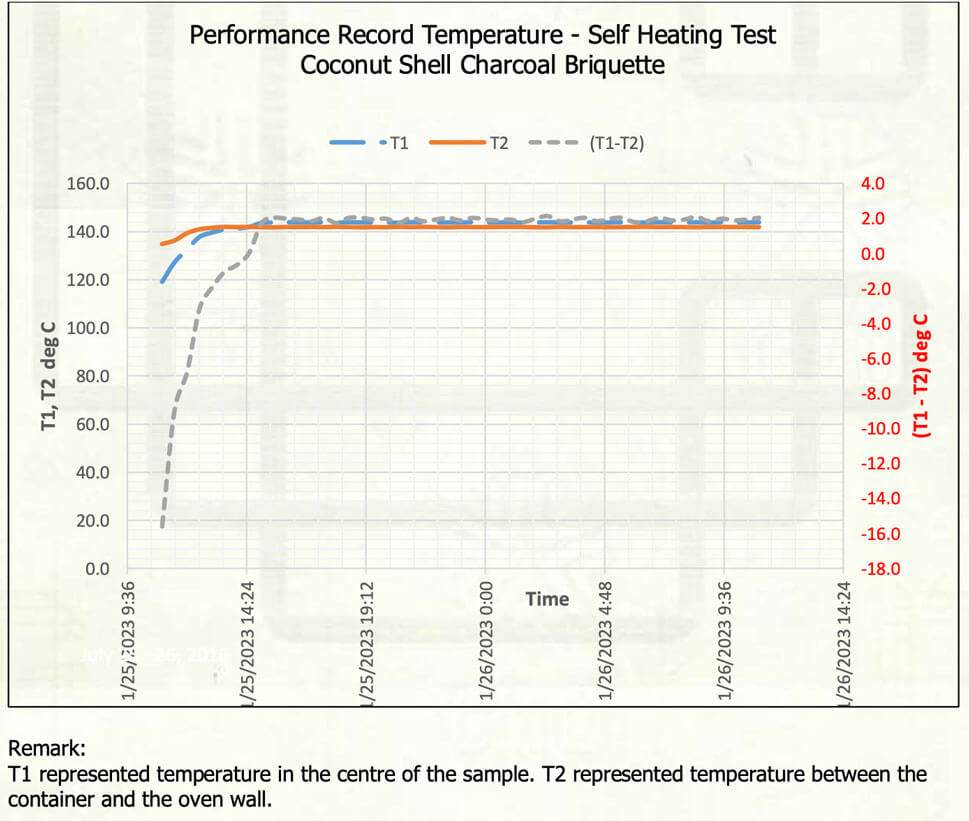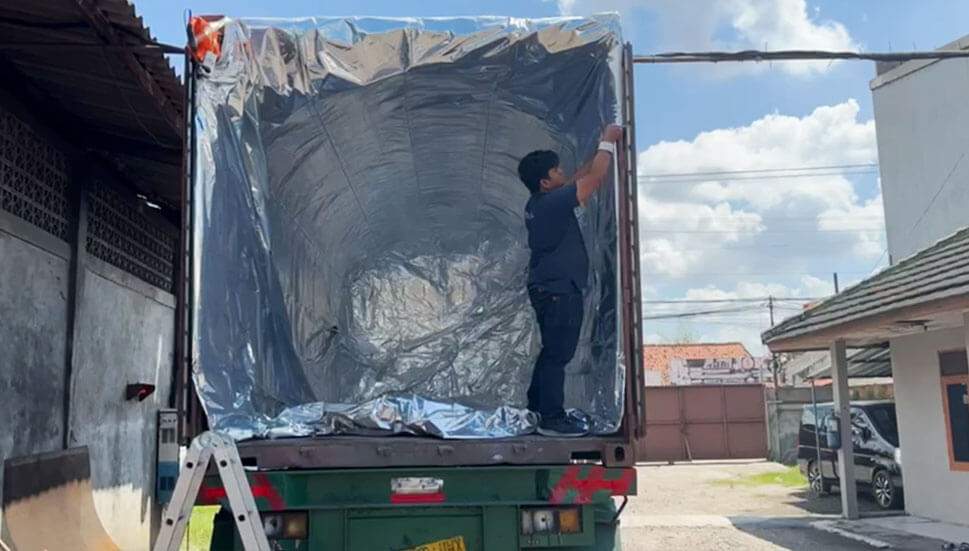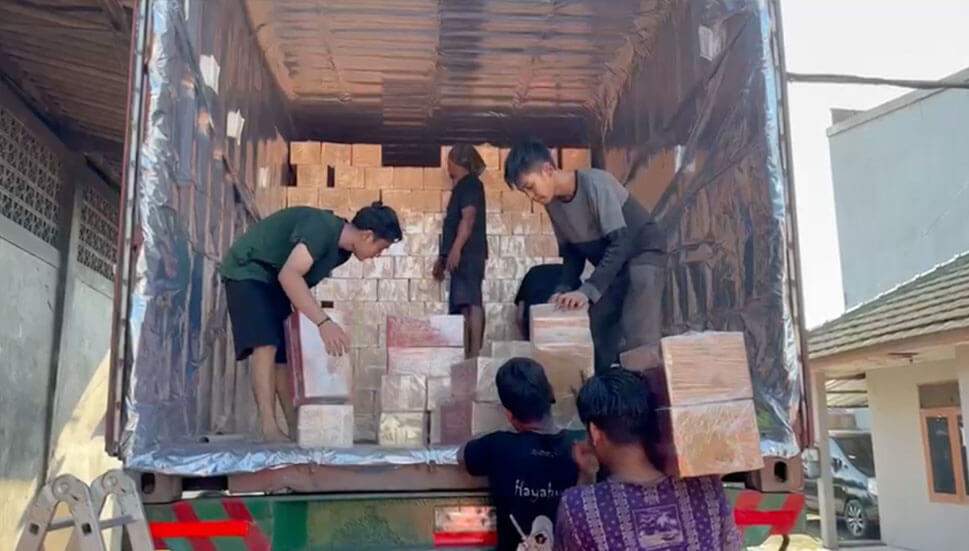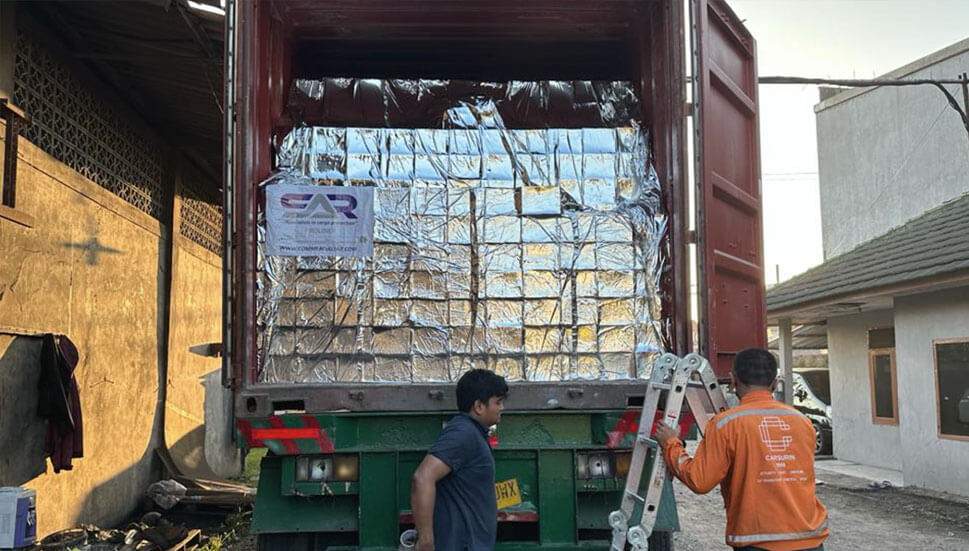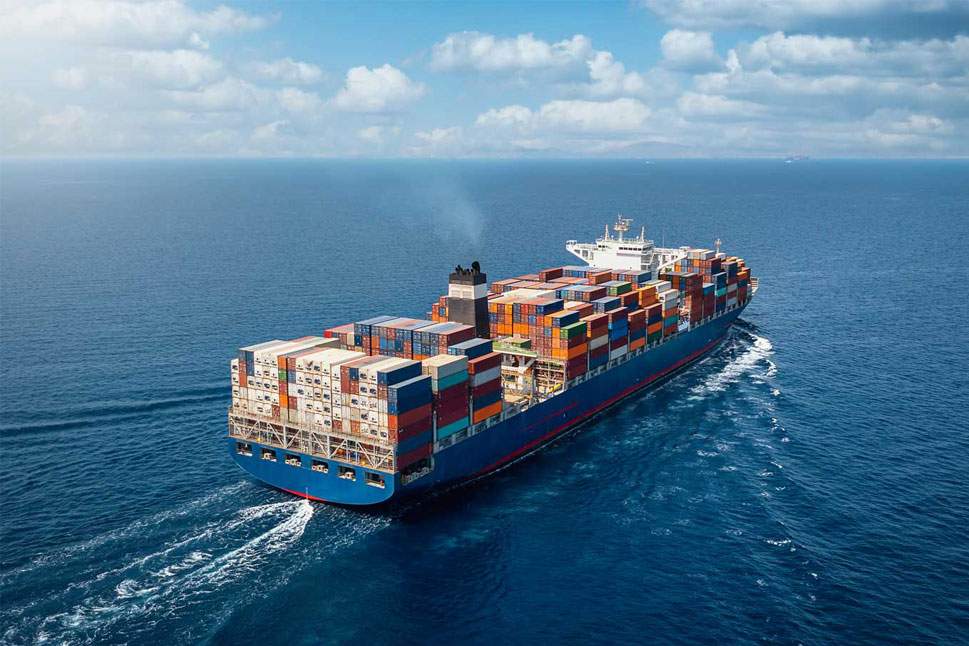Shipping coconut charcoal briquettes from Indonesia is a common practice, with the country exporting 30,000 metric tons of charcoal briquettes every month and holding a prominent position in the global market. Natural coconut charcoal briquettes, like those used in shisha or hookah, are in high demand around the world, and Indonesia supplies more than 90% of the world’s supply. Thanks to their superior quality, coconut shells sourced from Indonesia are widely recognized by a lot of countries as the best in the world for the production of charcoal briquettes used in shisha and hookah.
However, auto-ignition incidents on board caused by charcoal products have been a significant cause for concern for shipping charcoal briquettes in recent years, resulting in severe cargo damage, the destruction of vessels, and the loss of many lives. This has made charcoal being classed as a dangerous good and transporting charcoal products out of Indonesia becoming extremely difficult due to the substantial license required for transportation.
Are coconut charcoal briquettes for shisha and hookah really dangerous? How can we get them shipped out of Indonesia the right way? In this article, we hope to clear up some of the confusion that exists about the safety of shisha charcoal briquettes and the most recent shipping rules that pertain to this in-demand product.
In the past, some shady factories in the shisha business were known to add nitrates, which is commonly found in gunpowder, on purpose to the coconut charcoal briquettes for shisha so that they would automatically light when burned. Even though this “instant lighting” feature is, without a doubt, very popular in some markets, it poses a high safety risk during transport because the temperature inside the container will always rise, which could cause it to self-ignite.
It’s important to know that proper Indonesian shisha charcoal briquettes which are made of coconut shells do not contain any dangerous chemicals that can easily catch on fire. Compared to other types of briquettes, like the wood charcoal briquettes used for barbecuing and grilling, these coconut charcoal briquettes have been shown to be the safest and most resistant to fire.
Because charcoal briquettes are believed to be flammable, major shipping lines have been reluctant to take them on as shipments in recent years. The number of shipping companies agreeing to transport charcoal globally has consequently decreased.
Since June 2021, shipping coconut charcoal briquettes for shisha has been heavily regulated to address these ongoing safety concerns. Dangerous items like charcoal briquettes must require special handling, packing, and paperwork to protect the cargo and vessel. To decrease safety hazards related to shipping coconut charcoal briquettes globally, the use of refrigerated containers, heat blankets, and restricted cargo capacity is now mandatory.
Choosing the Best Shipping Line for Shipping Coconut Charcoal Briquettes
Knowing the guidelines set forth by shipping companies is essential when shipping coconut charcoal briquettes used in shisha. First, let’s take a closer look at two major shipping companies: MSC and MAERKS LINE, both of which have proven themselves to be adept at transporting hazardous materials.
MSC, which was founded in 1970, is one of the world’s largest shipping lines. It is committed to following international safety norms such as the ASTM and IMDG Codes. They prioritize cargo safety and security, especially flammable items such as coconut charcoal briquettes. MSC’s extensive global network provides extensive coverage and effective solutions for shipping coconut charcoal briquettes for shisha. Their vast reach provides reliable access to a variety of destinations.
While MSC is known for its safety compliance and broad network, MAERKS LINE excels at providing specialized solutions and is known for its customer-centric approach and excellent customer service.
Coconut charcoal factories as shippers should carefully examine their individual needs and consider these when choosing the best shipping line for shipping coconut charcoal briquettes.
From Factory to Destination: How to Ship Charcoal Step-by-Step with MSC or MAERSK LINE
Step 1: Book a Shipment with MSC or MAERSK LINE
To make a direct booking with MSC or MAERKS LINE for shipping coconut charcoal briquettes as dangerous goods, a factory audit license must first be presented to the shipping line, along with the consignee information and the preferred ship departure date.
Getting a factory audit license is challenging and takes an extensive amount of time, thus only a small number of charcoal factories in Indonesia own one. An independent third-party surveyor, like CARSURIN, must visit the factory site and complete a two-step audit and verification process.
After examining the audit results, a valid license is only granted to coconut charcoal briquette factories that meet necessary standards without any major organizational, paperwork, process, control, or security problems. This license gives charcoal factories authorization to ship coconut charcoal briquettes with the respective shipping line for a period of 12 months before they must be renewed. Note that charcoal factories must apply for the license separately for each shipping line.
We are proud to be one of the few charcoal factories that has its own factory license for shipping coconut charcoal briquettes. Therefore, we do not need to rent such licenses from other factories through so-called “under-name” services. It is important to know that we do not rent out our license to other companies or third-party forwarding services either as our license and its validity could be at risk otherwise.
Unlike general goods, where customers can organize international shipments on their own under Ex Works (EXW) or Freight on Board (FOB) terms, our customers rely on us to make bookings for shipping coconut charcoal briquettes on their behalf as a valid factory audit license is mandatory for the booking.
Once a booking is made, we will receive a booking reference number which serves as a unique identifier for the specific shipment and is essential for managing and tracking the shipment at a later stage.
Step 2: Undergo a Pre-Shipment Inspection by Carsurin
The next stage is for MSC or MAERKS LINE to select a credible third-party independent surveyor, CARSURIN, to conduct an on-site inspection at the production site on a mutually agreed date. It is important to note that the factory audit license and the address visited by the CARSURIN representative must match for the inspection to be successful. This verification procedure guarantees that the correct manufacturing facility is being examined and that the transported charcoal comes from an authorized factory. The majority of the charcoal must also be readily placed in its final box packaging for the inspection to begin.
CARSURIN will carefully sample the charcoal briquettes during the inspection. They will randomly pick samples to ensure they get a fair representation of the whole batch for shipping coconut charcoal briquettes. CARSURIN will photograph the charcoal in its final packaging to record its condition and verify that it meets all safety requirements.
The gathered samples will then be sent to a CARSURIN lab for further testing and analysis. Charcoal samples will be put through extensive tests such as Proximate Analysis (ROA) and the Self Heating Test (SHT) performed in accordance with ASTM and IMDG guidelines. The charcoal’s moisture content, ash content, and carbonization level, among others, are all thoroughly evaluated in the analysis for shipping coconut charcoal briquettes.
Charcoal briquettes’ ability to self-ignite and maintain a steady flame without the aid of an external ignition source is determined by the Self Heating Test. When storing and shipping coconut charcoal briquettes, which are considered potentially explosive materials, assessing the likelihood of spontaneous combustion is crucial for ensuring the safety of everyone involved.
Within 3–5 business days, CARSURIN will release a report detailing the results of these examinations prior to shipping coconut charcoal briquettes. An example CARSURIN test report for our facility can be seen in the figure below. Our charcoal briquettes have a very low ash content of 1.55%, a moisture content of 3.89%, and a comparatively high fixed carbon percentage of 82.21%.
During steady heating at 140 °C for 24 hours inside an oven, the self-heating test result shows that the maximum temperature achieved in the center of the sample is only 143.9 °C, indicating that the temperatures stay reasonably stable during the heating duration. As a result, the briquettes we make out of coconut charcoal shall not be considered self-heating materials.
The credibility and reliability of shipping coconut charcoal briquettes are truly strengthened by CARSURIN’s participation in the sampling, testing, and documentation of the entire process. By doing these tests, CARSURIN makes sure that they meet the standards and safety rules for shipping coconut charcoal briquettes.
Step 3: Receive a Container Delivery Order
Once Carsurin receives the test results, they immediately notify MSC or MAERKS LINE about the findings. Upon verifying that the test results comply with the necessary regulations and that all the accompanying documents are complete and accurate, MSC or MAERKS LINE proceeds to give approval for shipping coconut charcoal briquettes and issue a container delivery order.
A container delivery order indicates that the shipping container is ready to be delivered to the charcoal factory within 24 hours of the pre-determined stuffing date. Typically it contains important details such as but not limited to shipping carrier name, feeder vessel details, estimated time of vessel departure, container type, etc.
After the container delivery order is issued, the shipper is still allowed to make changes to the stuffing date without receiving any penalty as long as no changes were made to the feeder vessel on which the container is scheduled to go onboard.
Step 4: Load the Charcoal into the Container Covered with Proliner
When it comes to loading charcoal briquettes in the container, the proliner system is a key part of ensuring the safety and security of shipping coconut charcoal briquettes. With this method, a specially made liner is placed inside the container. This creates a barrier between the cargo and the container walls that keeps the load safe
Here are some key aspects of the role of proliner in shipping coconut charcoal briquettes:
- Minimized Movement: As the proliner is vacuum-sealed at the end of the stuffing process, it helps keep the charcoal briquettes together in place inside the container and eliminates the risk of damage to the packaging boxes and the charcoal briquettes within from shifting, moving, or colliding with each other.
- Leakage Prevention: Proliner also keeps them from touching the container walls directly and acts as a shield to keep the briquettes away from any spill or leakage during transportation.
- Moisture Protection: The effectiveness of coconut charcoal briquettes can deteriorate and crack when heated if they absorb too much moisture. Proliner helps prevent moisture from penetrating the briquettes so they perform optimally as intended.
- Enhanced Safety: Using proliner reduces the likelihood that the charcoal briquettes may catch fire on their own. The liner is an extra layer of protection, keeping the briquettes away from anything that could start a fire, heat or sparks.
First, the proliner is gently placed inside the container to cover the entire inside surface. Once the liner is in place, the charcoal briquettes can start to be loaded into the container with the supervision of a CARSURIN representative.
The right alignment of briquette master boxes is prioritized. The loading team ensures that the briquettes are evenly distributed and aligned to stabilize the cargo and reduce the danger of damage or breakage when handling and shipping coconut charcoal briquettes.
Creating a buffer zone when loading is also critical. A little gap of 10 – 30 cm is purposefully left between the briquettes and the container roof to protect the charcoal briquettes from external influences.
Once the container is fully loaded, a final examination ensures that the goods are safely positioned and packed in the container. This ensures shipment integrity and compliance with current safety regulations. The container is then sealed, securing the charcoal briquettes for travel to its final destination.
Depending on the size of the container and the equipment involved, the stuffing process generally takes 3–6 hours per container.
Step 5: Track Your Shipment Online
Shipping coconut charcoal briquettes made easy. Stay informed about your coconut charcoal briquette shipment’s status and location. MSC and MAERSK offer trustworthy and transparent tracking services by investing in innovative tracking technologies and efficient logistical networks. MSC or MAERSK lets you trace your shipment online in real time from the moment the empty container arrives at our factory until its projected arrival time at the port of destination.
Simply visit the MSC or MAERSK LINE tracking page and input your booking reference number or container number to track your shipment. These codes serve as your crucial identifier when shipping coconut charcoal briquettes from start to finish. The vessel name, current port of call, anticipated arrival time at the destination port, and intermediate stops are displayed on the tracking page. The tracking system also alerts you on schedule changes and delays, keeping you informed about your shipment.
A few days after the ship sails, the consignee has the option to receive a physical copy of the original Bill of Lading from MSC or MAERSK via DHL, or via Telex Release upon the surrender of the original Bill of Lading by the shipper to MSC or MAERSK.
The Risks of Misdeclaring: Consequences and Penalties for Dangerous Goods
Shipping coconut charcoal briquettes for shisha requires special handling because they are considered a dangerous good rather than a common commodity. It is not surprising that the shipping rate can be at least 50% more expensive than that of general goods. It is understood that some freight forwarding services may offer misdeclaration when shipping coconut charcoal briquettes, promising cheaper rates.
However, keep in mind that this is certainly not a recommended procedure when shipping coconut charcoal briquettes. Customers should not try to get around paying the correct tariff by falsely reporting charcoal briquettes as general commodities. Misrepresenting hazardous materials as something they are not can result in legal penalties, shipping delays, and a hefty fine. If you are caught shipping dangerous products without properly disclosing them with the right HS code, you could face fines of up to three times the shipment’s value.
It is critical to focus on the safety of your cargo and deal with reliable partners who value ethical and responsible practices when shipping coconut charcoal briquettes. As a competent and reputable Indonesian factory, we highly stress the importance of being compliant with current regulations and preventing item misdeclaration. We also book directly with MSC or MAERKS LINE without going through any freight forwarders or middlemen to ensure a competitive rate and hassle-free shipping.
Trust us to handle your charcoal briquette shipments properly, assuring compliance, safety, and seamless operations for your charcoal business. Book a free consultation with our trusted advisor today to learn more about our premium coconut charcoal briquettes for shisha and how we can assist you in shipping charcoal briquettes with the highest level of compliance and professionalism. We are dedicated to providing top-quality products, excellent aftersales service and expert guidance to ensure your ultimate success in the charcoal industry. Let us help you achieve your goals and make your shipping process as smooth and efficient as possible starting from today.

